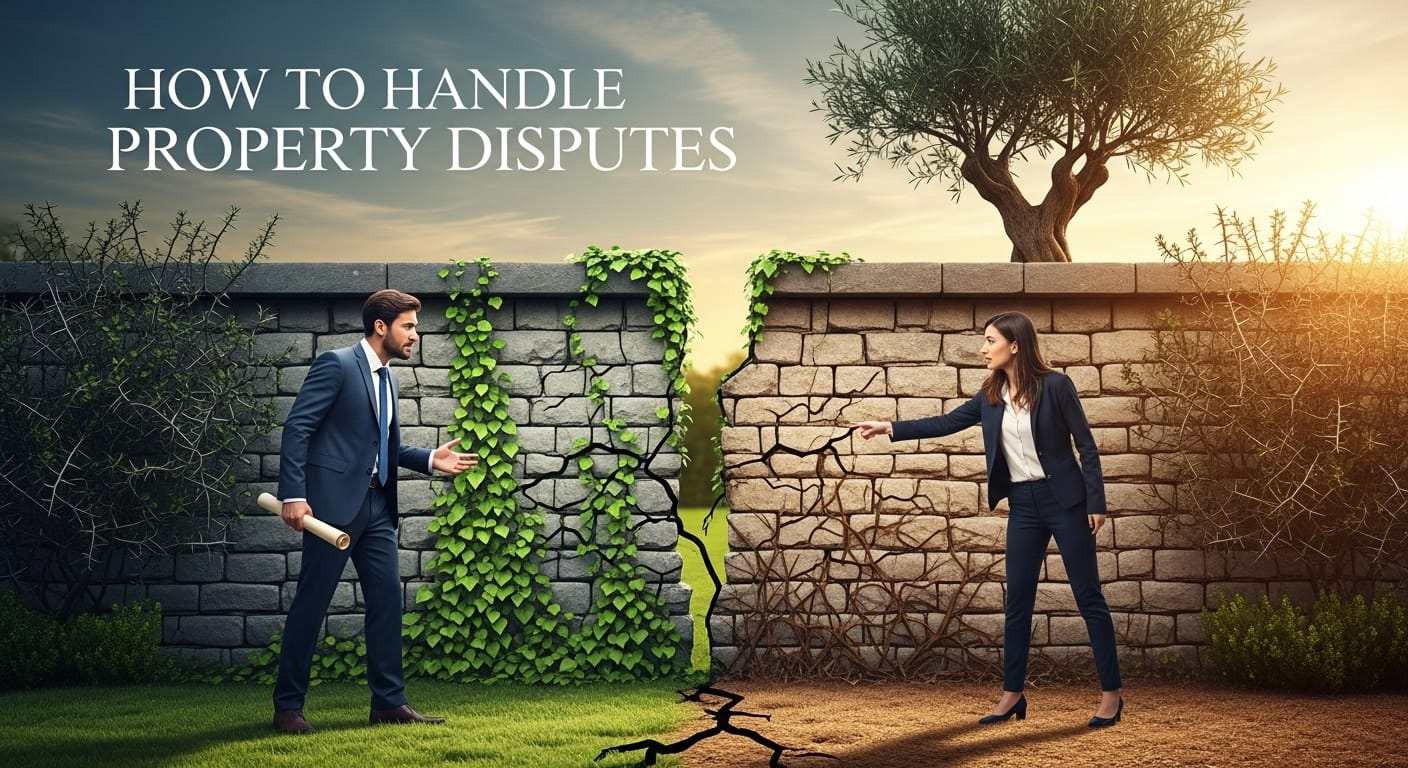Property disputes are like the unwanted weeds in the garden of life—nobody asks for them, yet they pop up and refuse to go away.
Whether it’s a boundary disagreement with your neighbor, a family feud over an inheritance, or a messy divorce dividing assets, these disputes have a unique way of making everyone involved feel like a contestant on a bad reality TV show.
The good news is that property disputes can be resolved, sometimes even without throwing your hands in the air and muttering about moving to a deserted island.

Top Takeaways and Key Concepts
Read the denial letter carefully to understand the exact reason your claim was denied.
Review your insurance policy to identify coverage details and locate clauses that support your appeal.
Gather strong evidence like photos, repair estimates, and written statements to prove your claim.
Speak with the insurance adjuster professionally to clarify misunderstandings and present new information.
Submit a written appeal that uses policy language and organized evidence to argue your case clearly.
Summary of This Article
Please Note: This post may contain affiliate links. If you click one of them, we may receive a commission at no extra cost to you. As an Amazon Associate, I earn from qualifying purchases.
This article explains how to respond when an insurance claim is denied and encourages policyholders not to give up after receiving a denial letter. It emphasizes the importance of first understanding the specific reason for denial by carefully reviewing the letter and contacting the insurance company for clarification. Readers are urged to review their policy in detail to identify coverage terms and potential misinterpretations. The article stresses the need for thorough documentation to support an appeal and recommends directly communicating with the insurance adjuster to resolve errors or disputes. It also advises submitting a formal written appeal that references policy language and includes supporting evidence. If the appeal fails, the article suggests considering legal assistance for larger or complex claims. Ultimately, persistence and preparation are key to overturning unfair claim denials.
Identifying the Root of the Dispute

The first step to handling a property dispute is understanding what you’re fighting about. Is it about land boundaries, ownership rights, or an access issue? Figuring out the core of the disagreement can save time and prevent you from yelling at your neighbor about their fence when the real problem is the tree growing over it.
By the way, having a clear title or deed is crucial in any property dispute. If the paperwork is messy or outdated, the dispute becomes more complicated. Reviewing your documents can help identify if the problem is a simple misunderstanding or something that requires legal intervention.
Open Communication

Believe it or not, talking to the other party can sometimes resolve the issue faster than any lawyer can. I know, the idea of a calm conversation might sound impossible when you’re fuming over a neighbor’s shed encroaching on your yard, but hear me out. Explaining your perspective and listening to theirs might reveal a solution that works for both of you.
Interestingly enough, many disputes spiral out of control because no one takes the time to talk it out early on. Once lawyers and courts get involved, things can escalate quickly, and suddenly you’re spending thousands over a two-foot strip of grass.
Mediation
When communication isn’t enough, mediation can be a helpful next step. Mediation involves a neutral third party who listens to both sides and helps facilitate a resolution. It’s like having a referee who keeps the game fair, except instead of whistles and penalties, there’s paperwork and compromise.
Mediation is often faster and cheaper than going to court, making it an appealing option for many property disputes. Plus, it gives both parties a sense of control over the outcome rather than leaving the decision to a judge.
Surveying and Expert Opinions
If the dispute involves boundaries or land usage, hiring a surveyor might be necessary. Surveyors are the people who show up with tripods and measuring tools, looking like they’re filming an episode of CSI: Property Lines. They determine the exact boundaries of your property based on legal descriptions and official maps.
On the other hand, expert opinions might be required for more complex cases, such as disputes over environmental issues or building permits. Bringing in professionals can clarify what’s legally allowed and provide evidence for your case.
Legal Representation
When the stakes are high or the other party refuses to cooperate, hiring a lawyer might be your best option. A good property lawyer can navigate the legal system, draft demand letters, and represent you in court if necessary. They can also help you understand your rights and whether suing for maximum compensation is realistic in your case.
To be fair, legal battles can get expensive. However, they might be worth it if the dispute involves significant property value or long-term consequences.
Filing a Lawsuit
Sometimes, the only way to resolve a dispute is by taking it to court. Filing a lawsuit should always be the last resort because it’s time-consuming, stressful, and costly. That said, if the other party is unreasonable or the matter involves serious financial or legal implications, a lawsuit can provide closure.
Interestingly, most property disputes settle out of court because going to trial is risky for both sides. Settlement negotiations can happen even after a lawsuit is filed, so don’t lose hope if it comes to this stage.
Understanding the Legal Framework
Property laws vary by state, which means what’s legal in one area might not be in another. Understanding local regulations and zoning laws is crucial in property disputes. Ignorance of the law might not excuse bad behavior, but it sure doesn’t help your case.
Consulting an attorney familiar with your state’s laws can save you from making mistakes that could weaken your position.
Maintaining a Cool Head
Dealing with property disputes can be frustrating, especially if emotions run high. Staying calm and focused on finding a resolution can prevent unnecessary drama. After all, the goal is to solve the problem, not create more of them.
Resources:
Property Disputes and Your Legal Rights
http://www.legalrights.com/property-disputes
Guide to Property Mediation
http://www.mediationinfo.org/property-mediation
Hiring a Property Lawyer
http://www.findlawyers.com/property-legal-help
Frequently Asked Questions
What are the most common causes of property disputes?
Property disputes often arise from unclear boundaries, ownership disagreements, easement or access issues, and inheritance conflicts. Identifying the root cause is the first step toward resolution.
Can open communication help resolve a property dispute?
Yes. Direct communication with the other party can often clarify misunderstandings and lead to compromise before involving lawyers or courts.
What is mediation in property disputes?
Mediation is a voluntary process involving a neutral third party who helps both sides reach an agreement. It’s typically faster and cheaper than litigation.
When should I hire a surveyor or expert for a property issue?
Hire a surveyor when disputes involve property lines or land use. Experts may also be needed for complex matters such as zoning, environmental, or construction-related claims.
When is it necessary to seek legal representation?
If the other party refuses to cooperate or the property’s value is substantial, hiring a property lawyer ensures your rights are protected and your case is presented effectively.
What should I consider before filing a lawsuit for a property dispute?
Lawsuits should be a last resort due to their cost and duration. However, they may be necessary if mediation fails or the dispute involves significant financial or legal consequences.
Why is understanding local property laws important?
Property laws differ by state, so knowing local regulations helps you make informed decisions and avoid legal mistakes that could weaken your case.

Kevin Collier is a legal expert passionate about simplifying complex legal concepts for everyday individuals. With a focus on providing clear, practical information, he covers a wide range of topics, including rights, responsibilities, and legal procedures. Kevin aims to empower readers with the knowledge they need to navigate the legal landscape confidently, ensuring they can make informed decisions regarding their legal matters. Through insightful articles and easy-to-understand resources, he helps demystify the law, making it accessible to all.










